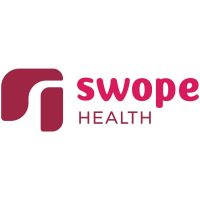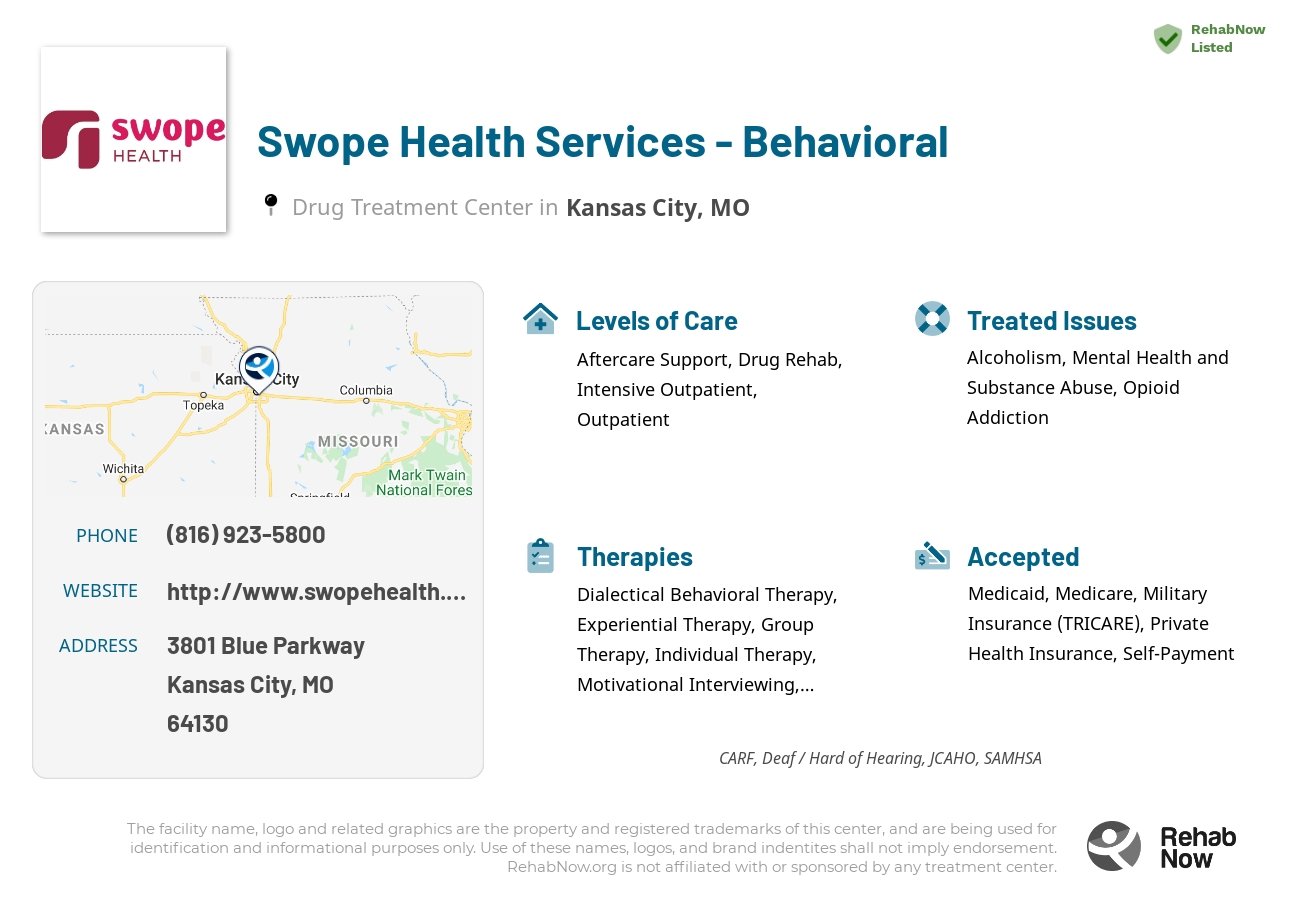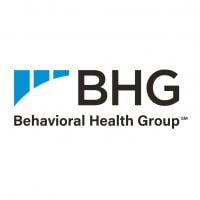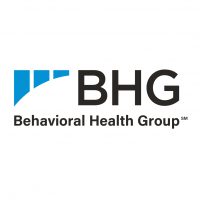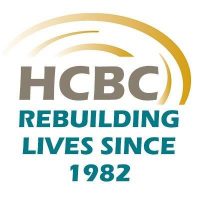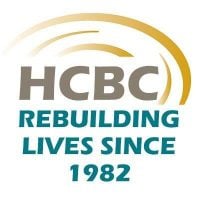Swope Health Services - Behavioral
Drug Rehab Center in Kansas City, Missouri
Swope Health Services - Behavioral in Kansas City, Missouri offers comprehensive mental health and substance abuse services, including addiction treatment services tailored to meet the needs of each individual, and is dedicated to providing quality care to empower clients to lead healthier, more fulfilling lives.
About Swope Health Services - Behavioral in Missouri
Swope Health Services - Behavioral is a trusted Addiction Treatment Facility located in Kansas City, Missouri. With a history dating back to 1969, this center has been dedicated to providing comprehensive treatment for individuals struggling with alcoholism, drug addiction, dual diagnosis, and opioid addiction. The facility offers a range of levels of care, including aftercare support, drug rehab, intensive outpatient, and outpatient programs, ensuring that individuals receive the appropriate level of support based on their specific needs. Swope Health Services - Behavioral has received accreditations from renowned organizations such as CARF, JCAHO, and SAMHSA, which speaks to their commitment to maintaining high-quality standards in addiction treatment. Additionally, the facility accepts private health insurance, making their services more accessible to individuals seeking help.
At Swope Health Services - Behavioral, individuals struggling with addiction and substance abuse can find a wide array of services tailored to their needs. The center provides comprehensive aftercare support, ensuring that individuals have the necessary resources and support system in place to maintain their recovery long-term. Their drug rehab program offers a structured environment for individuals to detoxify and receive addiction treatment, incorporating evidence-based therapies to address the underlying causes of addiction. The facility also offers intensive outpatient programs, where individuals can receive intensive therapy while still living at home and attending to their daily responsibilities. Additionally, Swope Health Services - Behavioral provides outpatient programs, allowing individuals to continue their treatment while gradually transitioning back into their regular lives. By offering a range of treatment options, Swope Health Services - Behavioral aims to meet the diverse needs of individuals seeking recovery from addiction and substance abuse.
Genders
Ages
Modality
Additional
Accreditations
SAMHSA

JCAHO

CARF
The Commission on Accreditation of Rehabilitation Facilities (CARF) is a non-profit organization that specifically accredits rehab organizations. Founded in 1966, CARF's, mission is to help service providers like rehab facilities maintain high standards of care.
Conditions and Issues Treated
Opioid addiction has become a significant health problem in the United States. In 2015, there were 91 opioid overdose-related deaths per day, with a substantial increase in mortality rate in 2014.
When opioid addiction has reached a point where a person’s life becomes unmanageable, treatment options are available to help them get sober. Treatment that includes medical care with medications and counseling can help a user transition into sobriety.
Levels of Care Offered
This center offers a variety of custom treatment tailored to individual recovery. Currently available are Aftercare Support, Drug Rehab, Intensive Outpatient, Outpatient, with additional therapies available as listed below.
The Intensive Outpatient Program offered by Swope Health Services - Behavioral is designed for those who need intensive care but would rather get it in the comfort of their own home. The treatment programs vary in duration and intensity and can be tailored to suit the patient’s needs. The program includes regular visits to the facility, though the overnight stay is not needed. IOP is suitable for patients who have been treated in residential treatment programs and are in the transition phase. It helps the patient live at home and discharge some work or school responsibilities even while undergoing treatment. The patients gradually get back to their routine life with the support of a friend or family member.
Outpatient treatment is often used for drug addicts in drug rehab. Outpatient treatment consists of counseling and therapy sessions. This form of treatment is also called ‘day-treatment’. The outpatient treatment process begins with the addict’s initial detox period, lasting about ten days.
Outpatient treatment is used for those who are at moderate risk for ‘slipping back’ into the addiction, for those who:
- Are not currently experiencing any side effects from withdrawal and can handle social pressure
- Can handle stressors that might trigger relapse
- Have a stable living environment or have moved out of their previous environment, which was not conducive to being sober
- Have a support system that allows them to go to a facility a few times a week while still keeping their current responsibilities
- Have no legal obligations, being either on parole or probation, that require them to seek treatment at a mandatory facility
- Are not currently experiencing any side effects from withdrawal and can handle social pressure
- Have a stable living environment or have moved out of their previous environment, which was not conducive to being sober
Completing a drug or alcohol rehab program is only the first step. Then comes aftercare support. These services include sober living accommodations, career counseling, and AA/NA programs for those struggling with sobriety or who want help maintaining it after initial rehab at an addiction facility.
They can last up to a year or more depending on what’s needed most urgently after the earlier stages are completed.
Therapies & Programs
Because no single treatment is effective for all addicts, the goal of treatment and therapy should be to figure out what works best for each individual. Tolerance and withdrawal levels differ from person to person, affecting the treatment intensity required. Addiction treatment should aim to help addicts develop healthy coping mechanisms for dealing with their addiction and its underlying causes.
Group therapy can help build a stronger support system and give addicts in Kansas City, MO insight into their addiction that they gain through shared conversations. Group therapy occurs in a controlled group environment, exclusive of one on one meetings. This makes it safer for patients to feel comfortable sharing the struggles they’re going through and gaining perspective.
Trauma therapy is beneficial for people who are recovering from drug addiction because it helps them heal from past traumas that may have caused them to turn to harmful substances or led them to experience negative emotions that contributed to their destructive behaviors.
This type of treatment works by processing difficult experiences so individuals can learn how to process these events without having to turn to substances for coping.
Trauma therapy can help addicts in the following ways:
- Helps individuals understand their experiences and emotional responses to difficult events, including why they turned to drugs or alcohol
- Provides them with comfort and support while working through difficult emotions related to these traumatic experiences
- Offers an opportunity for addicts to have a voice and be heard, which can improve their self-esteem
- Can help them develop coping skills so they can better respond to triggers instead of turning to substance abuse.
Dialectical Behavior Therapy (DBT) is a cognitive-behavioral therapy that helps patients understand the relationship between their thoughts, feelings, and behaviors. It is beneficial for those whose addictions and behaviors stem from severe mental health issues. The term “Dialectic” means the integration of opposites. In substance abuse, DBT refers to accepting the patient’s addiction and working to change their thoughts and behavior. It improves life skills such as controlling intense emotions without reacting impulsively, resolving interpersonal conflicts effectively, and promoting awareness about self and others.
Cognitive-behavioral therapy is a technique that is used to help people with addiction. Specifically, it is a way of identifying thoughts and behaviors that cause the addiction. It is typically used in an individual counseling session.
The content explains cognitive behavioral therapy and how it works to address some behaviors that may be leading to unintended consequences in their life, as well as its benefits for those seeking sobriety.
It works by helping people to talk through their issues and addressing the thoughts that cause said behaviors. It is an excellent way of learning about oneself and one’s perception of the world.
It’s important to remember that malnutrition can affect your mood and energy level, which affects your desire to get sober. Good nutrition helps keep your body strong against the familiar ravages of drug use–tuberculosis, hepatitis, abscesses, infections, etc. — as well as the physical symptoms of withdrawal. If you’re eating right, you’ll have more energy for productive activities and will have more strength to fight cravings.
Nicotine Replacement Therapy (NRT) has many benefits for drug addicts who also choose to quit smoking. It is an effective technique at this treatment center that provides smokers with the nicotine they are addicted to without inhaling carcinogens from cigarettes to wean them off entirely. You can reduce your risk of heart disease and cancer, irritability, bone loss, stroke, type II diabetes, fertility in women, an enhanced sense of taste and smell.
Patient Experience
Experiential Therapy at Swope Health Services - Behavioral
Experiential therapy uses engaging activities to help patients access deeper, often hidden emotions. For example, the patient could role-play a problematic situation or engage in activities like drawing, painting, poetry writing, music composition, exercising, or journaling to help process intense feelings.
Experiential therapy is a type of therapeutic approach that focuses on having patients work through problems, issues, or emotions by engaging directly in some real experience. Experiential therapy occurs face-to-face with a therapist who helps these people to explore their feelings first hand.
It is based on the belief that to truly understand and gain insight into oneself and behavior; it is necessary and helpful to have real experiences with the issues involved. Some therapists have developed the experiential therapy approach as a way of treating addictive behaviors or dealing with impulses related to addiction. It comes from an existential school of psychotherapy called ‘experiential existential.’
Payment Options Accepted
For specific insurance or payment methods please contact us.
Is your insurance accepted?
Ask an expert, call (888) 674-0062
Additional Details
Specifics, location, and helpful extra information.
Kansas City, Missouri 64130 Phone Number(816) 923-5800 Meta DetailsUpdated November 25, 2023
Staff Verified
Swope Health Services - Behavioral Patient Reviews
There are no reviews yet. Be the first one to write one.
Kansas City, Missouri Addiction Information
Opioid-related overdoses in Missouri have been increasing steadily for the past three decades. In 2018, more than 1,130 people in Missouri died from opioid abuse. Methamphetamines and marijuana abuse have surpassed opioid abuse in Missouri. Missouri is the number 1 methamphetamine manufacturer in the country with more than 27 meth labs per 100,000 people.
In Kansas City, Missouri, in 2016, there were 97 drug overdose deaths. There were 438 drug-related deaths in Kansas City in 2017, and that number is expected to rise in 2018. Drug addiction not only takes a toll on the individual but the entire community. Kansas City, MO, offers various drug treatment options for those looking to get sober. People who require around-the-clock assistance can enroll in these programs.
Treatment in Nearby Cities
- Piedmont, MO (246.3 mi.)
- Mountain Grove, MO (180.8 mi.)
- Saint James, MO (173.8 mi.)
- Poplar Bluff, MO (275.7 mi.)
- Fenton, MO (223.8 mi.)
Centers near Swope Health Services - Behavioral
The facility name, logo and brand are the property and registered trademarks of Swope Health Services - Behavioral, and are being used for identification and informational purposes only. Use of these names, logos and brands shall not imply endorsement. RehabNow.org is not affiliated with or sponsored by Swope Health Services - Behavioral.
